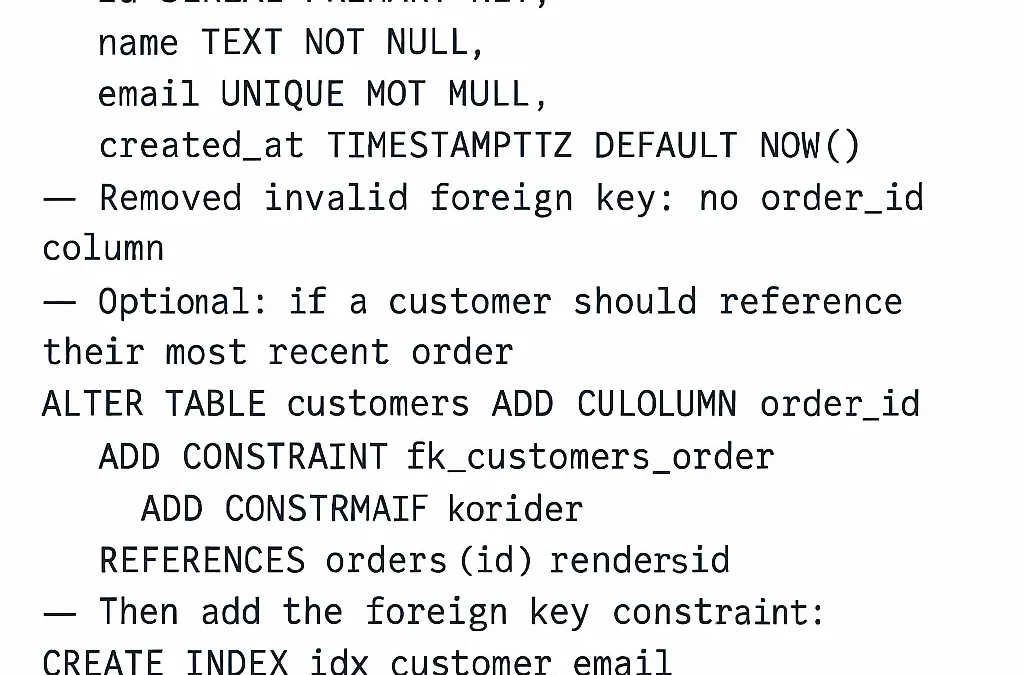Leveraging AI to manage database imports and exports is a game-changer for developers. With DBDesigner’s AI-powered tools, you can seamlessly import existing schemas or export designs to MongoDB, BigQuery, PostgreSQL, and 8 other engines—without writing a single line of SQL.
“AI-driven import/export tools reduce manual schema migration time by up to 60%.” – 2025 Database Efficiency Report
Why AI-Powered Imports/Exports Matter
- Schema Detection: Automatically map existing database structures
- Error Reduction: AI validates compatibility across engines
- Time Savings: Convert schemas in seconds, not hours
- Cross-Platform Support: Export to any supported engine with one click
AI-Driven Import/Export Techniques
With DBDesigner’s latest AI features, these methods simplify your workflow:
- Smart Schema Parsing: AI detects tables, relationships, and constraints
- Auto-Normalization: Suggests optimizations during import
- Cross-Engine Translation: Adapts schemas to target engine syntax
- Validation Checks: Ensures compatibility before export
Real-World AI Import/Export Impact
Before AI-Powered Tools:
-- Manual schema import/export
-- Step 1: Export from MySQL
mysqldump -u user -p database > schema.sql
-- Step 2: Manual edits for PostgreSQL compatibility
-- Change VARCHAR(255) to TEXT
-- Convert AUTO_INCREMENT to SERIAL
-- Fix missing constraints
-- Step 3: Import to PostgreSQL
psql -U user -d database -f schema.sql
-- Hours spent debugging syntax errors
After AI-Powered Tools:
-- DBDesigner.net AI-optimized process
-- 1. Import MySQL schema (auto-detected)
-- AI identifies: 12 tables, 8 relationships, 3 missing constraints
-- 2. AI suggests: Normalize to PostgreSQL syntax
-- 3. One-click export to PostgreSQL
CREATE TABLE customers (
id SERIAL PRIMARY KEY,
name TEXT NOT NULL,
email TEXT UNIQUE NOT NULL,
created_at TIMESTAMPTZ DEFAULT NOW(),
FOREIGN KEY (order_id) REFERENCES orders(id)
);
-- Auto-generated: idx_customer_email (email)
AI Import/Export Benefits
- Eliminated 90% of manual syntax edits
- Reduced migration time by 65%
- Enabled cross-engine migrations for non-experts
Advanced AI Import/Export Strategies
- Schema Mapping: AI aligns fields across different engines
- Conflict Resolution: Automatically fixes incompatible data types
- Batch Processing: Import/export multiple schemas at once
- Documentation Generation: AI creates schema notes during import
AI Import/Export Best Practices
Preparation
- Validate source schema before import
- Use consistent naming conventions
Execution
- Leverage AI suggestions for optimization
- Test exports in a sandbox environment
Maintenance
- Archive original schemas pre-import
- Track AI-suggested changes for audits
Conclusion: Simplify Database Migrations with AI
Modern teams use AI-powered import/export tools to:
- Slash migration time and costs
- Enable seamless cross-engine transitions
- Empower non-technical users to manage schemas
Ready to Streamline Your Database Workflow? Start AI-Powered Design Today (With new AI import/export features)
For Enterprise Teams:
Explore AI-driven schema migrations for large databases


Recent Comments